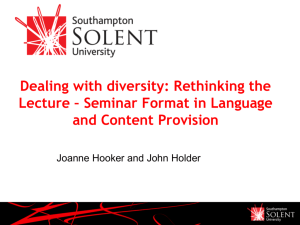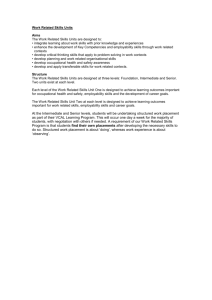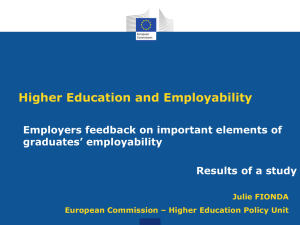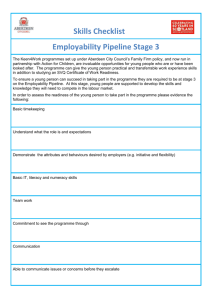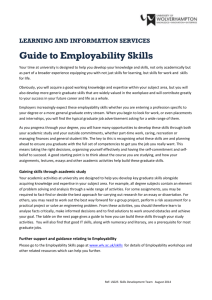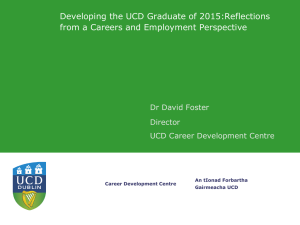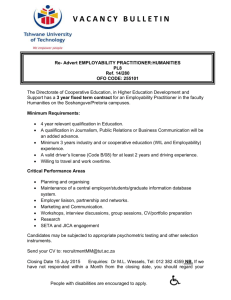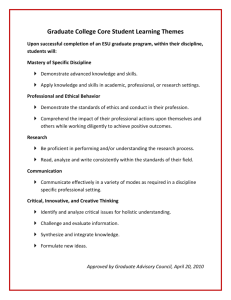Present
advertisement
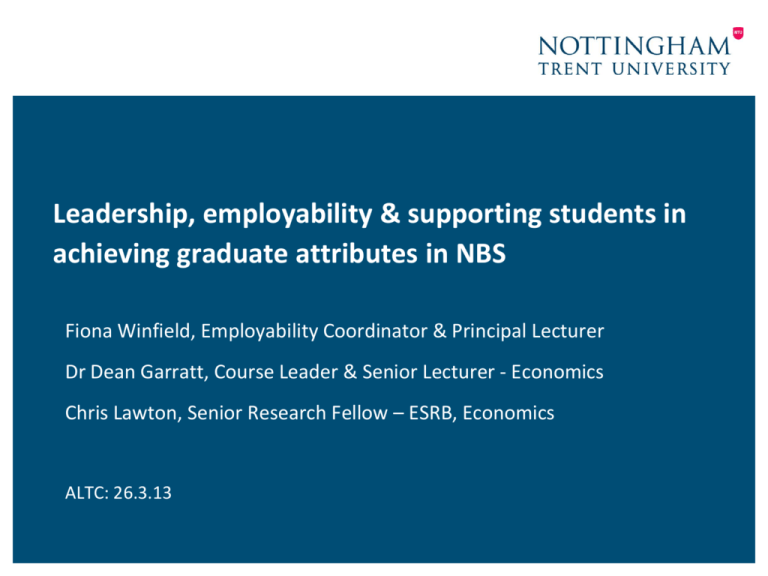
Leadership, employability & supporting students in achieving graduate attributes in NBS Fiona Winfield, Employability Coordinator & Principal Lecturer Dr Dean Garratt, Course Leader & Senior Lecturer - Economics Chris Lawton, Senior Research Fellow – ESRB, Economics ALTC: 26.3.13 Leadership, employability & supporting students in achieving graduate attributes in NBS • UNDERPINNING… • CareerEDGE mode • NTU’s Global Citizenship Graduate Attributes • NBS’S SOLUTION: ‘Leadership & Employability’ • ‘EMPLOYABILITY’ SKILLS AND THE ECONOMIST’S SKILLSET: Reflections on Delivering an Employability Module to 3rd Year Economics Students CareerEDGE Model (Dacre Pool & Sewell, 2007:np) Employability Self esteem Self efficacy Self confidence Reflection and Evaluation Career Development & learning Experience Work & life Degree subject knowledge, skills & understanding Graduate attributes & enterprise skills Emotional intelligence Global Citizenship: Graduate Attributes… • International awareness and openness to the world, based on appreciation of social and cultural diversity, respect for human rights and dignity. • Understanding and appreciation of social, economic or environmental sustainability issues. • Leadership capacity, including a willingness to engage in constructive public discourse, and to accept social and civic responsibility. Fiona Winfield How can we use the CareerEDGE model and ensure all the GAs are achieved? NBS’s solution: • New level 3 ‘Leadership & Employability’ • Core Module - most final year u/g • c1200 students • 1 module but 8 versions Fiona Winfield Accounting & Finance Business Economics Human Resources International Business Int’l Business Admin' Management Marketing Leadership & Employability Structure 2012-13 (2013-14 may vary slightly once review has taken place!) All Year: Career Management/Skills Workshops & Events, including lectures, talks, films, competitions… Term 1: Term 2: Course/Discipline based Group Assessment (50%) Global Citizenship/Career Mgt Individual Report/Portfolio (50%) (consultancy, event, presentation etc.) All Year: Personal tutor Groups 6 Learning Outcomes (A&F) a) Demonstrate knowledge of your chosen profession or discipline and a critical understanding of associated leadership and employability issues. b) Demonstrate an understanding and appreciation of social, economic and sustainability issues within the context of your chosen profession or discipline. c) Demonstrate how effective strategic leadership improves strategic and financial management decision-making, leading to achieving and sustaining competitive advantage. d) Demonstrate the ability to work effectively as a member of a team. e) Demonstrate the ability to reflect critically on your achievement of NTU’s Graduate Attributes and your own employability, allowing you to manage your future career. f) Demonstrate the ability to employ diverse research methods and communicate findings in an effective manner. Fiona Winfield Learning Outcomes (Economics) a) Demonstrate knowledge of your chosen profession or discipline and a critical understanding of associated leadership and employability issues. b) Demonstrate an understanding and appreciation of social, economic and sustainability issues within the context of your chosen profession or discipline. c) Demonstrate a critical understanding of the skill-set which economists can bring to the workplace. d) Demonstrate a critical understanding of the applicability of economic concepts and techniques to a range of workplace scenarios. e) Demonstrate the ability to work effectively as a member of a team. f) Demonstrate the ability to reflect critically on your achievement of NTU’s Graduate Attributes and your own employability, allowing you to manage your future career. g) Present economics-based information in an effective manner, appropriate to its potential audience. Fiona Winfield ‘Employability’ Skills and the Economist’s Skillset Reflections on Delivering an Employability Module to 3rd Year Economics Students Outline Questions • What are ‘employability skills’ and why are they important at this time? • What’s our take on this, from previous non-academic work experience as well as from an educational and economic perspectives? • What’s the evidence on the skills employers value? • How have we tried to apply this evidence in a 3rd year assessment task? • What elements of this practice went well and less well, and what can we learn for future practice? Why are Leadership & Employability skills so important? • UK, European and North American labour markets all affected by recession • UK unemployment increased from 5% in 2007 to 7.8% in 2012/13 • Unemployment in the EU was 10.8% in January 2013 • Young people particularly affected. UK youth unemployment (1624) has almost doubled – to 21% nationally and 29% in Nottingham • There are 5 unemployed people to every 1 advertised vacancy • The number of recent graduates has increased from 1 million to 1.5million between 2001 and 2011 • An increasing proportion of recent graduates are in low-skill jobs compared to 10 years’ ago 11 Graduate Employment Rates Source: ONS CROWN COPYRIGHT, March 2012. ‘Graduates in the Labour Market -2012’. Online Resource. URL: http://www.ons.gov.uk/ons/dcp171776_259049.pdf [accessed 7th September, 2012]. What are ‘Employability Skills’: Definitions from the Literature • Inherent outcomes of an academic curriculum? • Course/Discipline specific (and applicable in the workplace)? • Job specific vs. lifelong learning? • Generic/Transferable – e.g. communication, presentation, team working, planning & organisation? • Career Management & Job Search? • Reflection (on all of the above, or principally on the utility of the discipline to the workplace and wider world)? National Employer Skills Survey • Majority of employers have a positive view of graduates’ skills • 82% of employers who recruited graduates straight from education found them ‘well prepared for work’ – compared to 64% for school leavers and 72% for college leavers • Attributes lacking in young recruits: lack of motivation/poor attitude (less of an issue for graduates – just 4% of graduate recruiters) • Skills lacking: planning & organising, customer handling, oral communication, problem solving, written communication and team-working skills – but again, much more likely to be lacked by school or college leavers • For all recruits – employers place a priority on ‘job specific’ skills (almost half of unfilled vacancies ) with ‘transferable’ or ‘generic’ or ‘softer’ skills accounting for a significant, but smaller share (around a third) Economics Network Alumni and Employers’ Surveys (2004 and 2007) Economics graduates’ strengths • Analytical thinking • Familiarity with use/misuse of data • ICT Skills • Understanding of core principles of their subject and technical ability • Willingness to learn and continually update their knowledge • Transferable skills, applicable across Service sectors, such as project management and presentation skills Economics Network Alumni and Employers’ Surveys (2004 and 2007) Economics graduates’ weaknesses • Applying their knowledge to practical problem solving • Applying knowledge in situations that require improvisation, commercial awareness or a sensitivity to human or cultural contexts • The ability to work in teams • Communication (written and verbal) of technical information– the ability to clearly describe theory or approaches, especially during the interview and application process • Limited communication styles – require experience of a wider range of communication formats, incl. presentations, reports, management briefings, journalistic articles Weaknesses observed in both new recruits and applicants –a large share of applications insufficiently detailed or accurate ECN Survey, 2007: Skill requirements of employers who recruit economists ECONOMICS NETWORK and ROYAL ECONOMICS SOCIETY, 2007. ‘The Skills and Knowledge of a Graduate Economist’ Term 1 Leadership & Employability Assessment Generic/transferable skills developed/assessed: • Planning and organising • Communication: – Verbal – Written • Team work Project management life-cycle; Group project; Formative presentation; Summative consultancy ‘bid’; Problem-based learning Discipline specific skills developed/assessed: • Application of theory and approaches to contemporary problems – within resource constraints (time/client’s budget) • Development of method • Data presentation and interpretation • Critical assessment of theory The Brief for the Group Consultancy Bids Demonstrate how you would deliver a consultancy project on one of these themes, within a £50,000 budget Align your group’s skills and experience to your client’s needs • The environmental impacts of the ‘Boris Island’ airport proposal • The impact of new regulation on the competitiveness of the UK finance sector Evidence required to inform the business strategy of a new mortgage lender • Evidence on equality and diversity issues for apprenticeship provision in Nottingham • Evidence for Information, Advice & Guidance on the graduate labour market in Nottingham Reflections on the Exercise Assessments were good because: – Professional presentation of bids - ‘business-like’ voice, good presentation and interpretation of data – Team working (in most cases!) – Appreciation of the nature of the task – almost all students understood what was required and were able to appreciate the real-world relevance – Appreciation of challenges/wider applications of the discipline Assessments were weaker because: – Individual reflective element - how well equipped are NBS 3rd years to critically evaluate their own performance? – Ability to work in a problem-based assessment environment – many students needed significant supervision/tutor input – Identification and application of theory and literature (unprompted) Which of these definitions of Employability can we/should we deliver against? • Inherent outcomes of an academic curriculum • Course/Discipline specific skills (and applicable in the workplace)? • Job specific vs. lifelong learning • Generic/Transferable – e.g. communication, presentation, team working • Career Management & Job Search • Reflection (on all of the above, or principally on the utility of the discipline to the workplace and wider world) …. Across the curricula? In a standalone cross-discipline module (at level 1, 2 or 3)? In a discipline-specific module? What are the costs/benefits/risks of each….. Your thoughts? • How would you embed the Global Citizenship Graduate Attributes? • (or how are you doing this?) • What about encouraging ‘Emotional Intelligence’?
